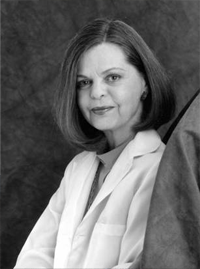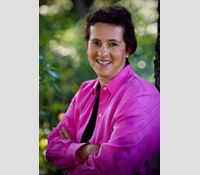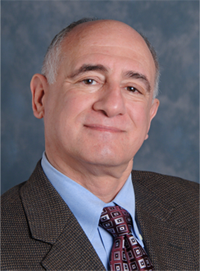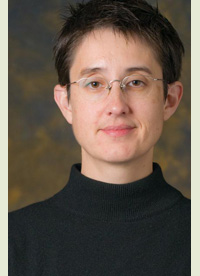Faculty Bios
Meet the conference scholars

Course Director: Marianne J. Legato, M.D., F.A.C.P.
Professor of Clinical Medicine
Founder and Director, Partnership for Gender-Specific Medicine at Columbia University
Founder and Director, The Foundation for Gender-Specific Medicine, Inc., Columbia University College of Physicians & Surgeons, New York, New York
Dr. Marianne J. Legato is an internationally recognized specialist in women's health and the founder and director of the Partnership for Gender-Specific Medicine at Columbia University. She has devoted much of her research to the subject of women and heart disease and in 1992 won the American Heart Association's Blakeslee Award for a book she wrote for the public on women and heart disease. She is the founder and editor of The Journal of Gender-Specific Medicine and a leading advocate for the inclusion of women in clinical trials.
Marianne J. Legato was born in 1935, in New York. She grew up accompanying her father, a general practitioner, on house calls and hospital rounds, and knew by the age of 3 that she wanted to follow him into a career in medicine. Although he had high expectations for his daughter, her father was anxious to protect her and opposed her decision to go to medical school. She enrolled at his alma mater, New York University College of Medicine, but could not persuade him to allow her to have her independence and a career in medicine.
Sadly, Dr. Legato was forced to begin her career without the support of her family. She credits her success in medical school and after graduation to the mentorship of Dr. Jose Ferrer and Dr. M. Irené Ferrer, whom she met at the Columbia University College of Physicians and Surgeons. Dr. M. Irené Ferrer even visited the dean of New York University College of Medicine to arrange for Legato to complete her tuition, and paid the fees herself. Dr. Legato has two children, Christiana and Justin, who have grown up as part of Dr. Ferrer's extended family and know her as "gran".
After graduating in 1962, Dr. Legato completed an internship and junior residency at Bellevue Hospital and a senior residency at the Presbyterian Hospital of the City of New York. From 1965 to 1968 she was a visiting fellow in cardiology at the Columbia University College of Physicians and Surgeons and in 1968 she was appointed instructor in medicine, beginning an academic career at the university, which she continues today as a professor of Clinical Medicine at Columbia University, College of Physicians and Surgeons.
Since 1969, Dr. Legato has been an attending physician at St. Luke's-Roosevelt Hospital Center, and since 1973 she has also worked as physician in medicine at the Presbyterian Hospital in the City of New York. She is currently senior attending physician at St. Luke's-Roosevelt and has been an attending physician at the Presbyterian Hospital since 1998. She has held several teaching appointments and committee memberships at both institutions, and in 1997 founded the Partnership for Gender-Specific Medicine at Columbia University College of Physicians and Surgeons. She is also the founder and editor of the Journal of Gender-Specific Medicine.
As director of the Partnership, Dr. Legato promotes collaboration between academic medicine and the private sector to promote research on gender-specific medicine. Her mission is to ensure the inclusion of women in clinical trials of relevance to the health of both sexes, to promote the study of differences in the biology of men and women and how gender affects the diagnosis and treatment of disease, for the benefit of all patients. The Partnership for Gender-Specific Medicine is raising funds for the M. Irené Ferrer Professorship in Gender-Specific Medicine at Columbia University.
Dr. Legato has won extensive professional recognition for her work, including the Martha Lyon Slater Fellowship from 1965 to 1968 and in 1971, the J. Murray Steele Award, both from the New York Heart Association. In 2002 she received the Woman in Science Award from the American Medical Women's Association.
Dr. Legato is also a popular author and speaker for non-medical audiences, and in 1992 won the American Heart Association's Blakeslee Award for the best book on cardiovascular disease written for the lay public. She has appeared on Good Morning America, The Today Show, and the Oprah Winfrey Show and was named an 'American Health Hero' by American Health for Women magazine in 1997 and A 'Heroine of Women's Health' by the Ladies Home Journal in the fall of 2000.

Pamela Dalton, Ph.D., M.P.H.
Member, Monell Chemical Senses Center, Philadelphia, Pennsylvania
My research attempts to broadly understand how cognitive and emotional processes modify the way we perceive odor and sensory irritation from volatile chemicals. One approach involves examining the associations and disassociations between subjective (self-report) and objective markers of irritation (e.g., ocular inflammation, nasal blood flow, respiratory patterns) resulting from chemical exposure. Another line of investigation examines the relationship between exposure frequency, adaptation and clinical sequelae from exposure to airborne chemicals, both in the laboratory and in occupational and community settings. In a related effort, modeling how odorant transport factors (e.g., physico-chemical characteristics of the odorant, nasal airflow, inflammatory changes) affect these processes can provide additional insight into variation in olfactory perception among the population.

Alice D. Domar, Ph.D.
Executive Director, Domar Center for Mind/Body Health, Waltham, Massachusetts
Director of Mind/Body Services at Boston IVF
Assistant Professor of Obstetrics, Gynecology, and Reproductive Biology, Harvard Medical School, Boston, Massachusetts
Alice D. Domar, Ph.D. is a pioneer in the application of mind/body medicine to men's and women's health issues. She not only established the first Mind/Body Center for Women's Health, but also conducts ongoing ground-breaking research in the field. Her research focuses on the relationship between stress and different women's health conditions, and creating innovative programs to help women decrease physical and psychological symptoms.
Dr. Domar received her M.A. and Ph.D. in Health Psychology from Albert Einstein College of Medicine/Ferkauf School of Professional Psychology of Yeshiva University. Her post-doctoral training was at Beth Israel Hospital, Deaconess Hospital, and Children's Hospital, all in Boston.
She has conducted research on infertility, breast cancer, menopausal symptoms, ovarian cancer, and premenstrual syndrome. Dr. Domar has earned an international reputation as one of the country's top women's health experts.
She is currently the Executive Director of the Domar Center for Mind/Body Health, and the Director of Mind/Body Services at Boston IVF. She is an assistant professor of Obstetrics, Gynecology, and Reproductive Biology at Harvard Medical School, and a senior staff psychologist at Beth Israel Deaconess Medical Center.
Dr. Domar has compiled an impressive list of accomplishments as a best-selling author, media authority and sought-after public speaker. She is the author of numerous books, on the advisory board for Parents Magazine, Health Magazine, Conceive Magazine, and Resolve, and on the Board of Experts for LLuminari. Two of her books have been finalists for the Books for a Better Life Award. She was also the Series Editor for a series of mind/body books by Harvard Medical Publications/Simon and Schuster. She is the narrator of the DVD's “Stress and Relaxation Explained” and “Infertility Explained”, both of which won silver Telly Awards. Dr. Domar has appeared on the Today Show, Good Morning America, CBS This Morning, Dateline NBC, CNN, PBS, and the CBS and NBC Evening News, to name a few. She presents lectures and conducts workshops throughout the US and around the world and went on tour with Oprah in the spring of 2004 and 2005 with the LLuminari team. Dr. Domar was named to the prestigious list of 15 “Women to Watch in 2004” by Lifetime TV. Her newest book is “Be Happy Without Being Perfect” (Three Rivers Press, March, 2009) and she is currently working on a new book, co-authored with Dr. Susan Love, called “Live a Little” (Crown, December, 2009). She is also a featured expert on the new online social health network BeWell.com.

Richard L. Doty, Ph.D.
Professor of Otorhinolaryngology
Director of The Smell and Taste Center, University of Pennsylvania Medical Center, Philadelphia, PA
My research is focused on better understanding the chemical senses (olfaction and taste) from both basic and clinical perspectives. Clinically, I am very much interested in the changes which occur in olfactory function in a number of disease states. We have demonstrated, for example, that individuals with Parkinson's disease and with Alzheimer's disease often have major loss of smell function.
Another research area in which I am actively engaged is that of neuropharmacological manipulation of olfactory perception. We have shown, for example, that low doses of d-amphetamine enhance the rat's ability to detect odorants, whereas moderate doses depress such ability. This research uses sophisticated computer-controlled olfactometers and operant conditioning signal detection tasks to measure the sensitivity of the animals. We have found that 6-OHDA elimination of olfactory bulb norepinephrine has no effect on odor detection performance, however, suggesting that the d-amphetamine phenomenon may not be mediated through locus coeruleus projections to the olfactory bulb. We are currently evaluating the influences of D-1 and D-2 receptor agonists and antagonists to better understand the mechanisms producing this and related phenomena.
A major research focus has been to develop clinically useful smell and taste tests. The University of Pennsylvania Smell Identification Test - a product of this program - is now the international standard for human olfactory measurement and is used in thousands of clinics and laboratories throughout the world. Associated with this program is the exploration of the influences of procedural variables upon quantitative measures of olfactory function.
Other research areas of interest include: (a) correlation of plaque numbers in circumscribed brain regions in multiple sclerosis with quantitative measures of audition, balance, taste, smell & touch; (b) influences of estrogen on preventing or mitigating age-related sensory changes; (c) influences of neurotoxic agents on smell and taste function; (d) age-related influences on sensory function; (e) disease-related histological changes in the olfactory pathways.

Elizabeth Gould, Ph.D.
Professor of Psychology, Department of Psychology, Princeton University, Princeton, New Jersey
My laboratory studies neurogenesis (the production of new neurons) and other forms of structural plasticity in the early postnatal and adult mammalian brain. Several decades ago, new cells with neuronal characteristics were reported in the hippocampus, olfactory bulb and neocortex of adult brains first by Altman and then by Kaplan. Despite these early reports, relatively little progress has been made toward understanding the control of neuron production in these areas and neurogenesis in the adult neocortex remains controversial. My laboratory explores issues related to the regulation of cell production and survival in these three brain regions in rodents and primates (marmosets and macaques).
We have found that stressful experiences inhibit the production of new neurons in the hippocampus of adult rodents and primates. Moreover, developmental stress (either prenatal or early postnatal) persistently diminishes the production of new neurons, even into adulthood.
We are trying to answer the following basic questions: How do hormones modulate the production of new neurons? What types of experience affect new cell production? What are the mechanisms that underlie hormonal and experiential modulation of structural plasticity? What possible role could late-generated cells play in brain function?

Serge Marchand, Ph.D.
Director of the Centre de recherche clinique Etienne-Le Bel
Full Professor, Universite de Sherbrooke, Faculty of Medicine, Sherbrooke, Quebec, Canada
Dr. Marchand has training in psychology (B.A.), kinesiology - Physical Activity Sciences (M.Sc.), neurological sciences (Ph.D. from the Université de Montréal) and a post-doctoral training in neuroanatomy of pain from the University of California in San Francisco (UCSF), completed in 1994.
Before joining the Neurosurgery Service in the Faculty of Medicine and Health Sciences of the Université de Sherbrooke (UdeS) in 2002, Dr. Marchand was the director of the research laboratory on pain at the Université du Québec in Abiti-Témiscamingue (UQAT). He is still in charge of this laboratory and holds a chair in pain, which is shared between UQAT and UdeS. Dr. Marchand's work on the role of endogenous mechanisms of pain control and on the development and treatment of pain are recognized at a national and international level. He is the author of a book, of numerous book chapters and of several articles dealing with the mechanisms involved in pain perception and pain treatment. In addition, Dr. Marchand has just received the Édouard-Montpetit Medal, a distinguished award emphasizing his engagement in research on pain treatment in Québec.
His fundamental and clinical training on the neurophysiological and psychological origins of pain allows Dr. Marchand to fully investigate the multidimensional facets of pain. Since his arrival at the Faculty of Medicine and Health Sciences of the Université de Sherbrooke, Dr. Marchand runs both a fundamental and a clinical research laboratory on the neurophysiological mechanisms of pain. As director of these labs, he supervises a large number of students at different levels of their academic careers, from the summer trainee to the post-doctoral professional. Finally, he is also the director of the research team on pain and director of the new neuroscience and pain division of the CHUS' (Centre Hospitalier Universitaire de Sherbrooke) clinical research center.
Dr. Marchand's research seeks to understand the neurophysiological mechanisms responsible for the development and persistence of chronic pain states. In collaboration with his colleagues from UQAT and Université de Sherbrooke, his projects deal as much with pain at the early developmental stages of life as they do with pain in the elderly. The techniques he uses include immunohistochemistry on nerve tissue, animal models of pain and electrophysiological recordings among chronic pain patients. After demonstrating that odours play an important role on pain perception, a finding which has aroused a great deal of interest in the media, he currently uses animal models to better understand the role played by sex hormones on the central nervous system's response to pain. His concern in the role played by sex hormones in the development and persistence of pain is also present in his clinical studies, for which he is funded by the Canadian Institutes of Health Research (CIHR). These projects could lead to important advances concerning the specific role played by gender in the development of certain chronic pain conditions, such as fibromyalgia.
Pain research is rapidly growing at the Faculty of Medicine and Health Sciences of the Université de Sherbrooke, which is in fact one of this institutions' top priorities. Dr. Marchand is setting up a team of fundamental and clinical researchers specialized in the field of pain. The hope is that solutions can be found to a problem that often represents the main reason why patients consult and which becomes chronic for as much as 20% of all Canadians.

Bruce S. McEwen, Ph.D.
Alfred E. Mirsky Professor, Harold and Margaret Milliken Hatch Laboratory of Neuroendocrinology, The Rockefeller University, New York, New York
Throughout life, hormones alter behavior and mood, regulate neuroendocrine activity, protect the brain from stress and regulate brain aging and certain disease processes. Dr. McEwen's laboratory studies how stress and sex hormones act on the brain, taking an interdisciplinary approach that combines behavioral analysis and measurements of hormone levels with neurochemical, morphological, neuropharmacological, cellular and molecular methodologies and collaborative translational studies.
The neuroendocrine system links behavior and experience with hormone secretion. In turn, hormones act on the brain and other organs to regulate functions such as reproduction, fluid and mineral intake and balance, metabolism and activity of the immune system. They also help shape the developing brain, affect mood and behavior and contribute to aging and certain diseases. Dr. McEwen studies the cellular and molecular mechanisms underlying the effects of stress and sex hormones on neurogenesis, synaptogenesis and dendritic remodeling in the hippocampal region of the adult and developing brain. The hippocampus is involved in the formation of episodic, spatial and contextual memories, and is one of the first brain structures to degenerate in Alzheimer's disease.
In relation to sex hormone action, the McEwen lab has identified sex hormone receptors in the hippocampus that regulate signaling pathways associated with synapse formation and maturation involving regulation of protein synthesis, neurotransmitter release and cytoskeletal remodeling. These “nongenomic” forms of the classical sex hormone receptors work in concert with the more classical genomic actions of sex hormones on gene expression.
In relation to stress, the McEwen lab has found that hormone actions on structural plasticity are intertwined with the actions of excitatory amino acid transmitters, kainate receptors, serotonin, GABA, other neurotransmitters and BDNF. In the dentate gyrus, chronic stress reduces neuron number and contributes to cognitive impairment, Dr. McEwen has found. In the hippocampus, chronic stress causes neurons to undergo remodeling of dendrites. Excitatory amino acids -- in particular, NMDA receptors -- are important regulators of neuronal remodeling, acting in concert with glucocorticoids. Kainate receptors, a class of ionotropic glutamate receptors in the hippocampus, are important players as well. In particular, the KA1 subunit is upregulated by chronic stress. The lab has also shown that the stress-induced remodeling is largely reversed once the stress is removed.
The McEwen lab has recently expanded its scope of study to investigate stress-induced structural remodeling in two regions of the brain: the amygdala, which is involved in fear and strong emotions, and the prefrontal cortex, which is involved in working memory, decision making and extinction of fear learning, among other functions. Recent work has found in humans an effect of chronic perceived stress on mental flexibility and functional activity in the prefrontal cortex that is analogous to studies in an animal model.
Work by the neuroimmune-physiology group headed by Karen Bulloch has revealed important cell types characteristic of the immune system, namely brain dendritic cells, that are present in the normal, undamaged brain and are activated in response to simulated stroke and interferon-. The group is working to characterize their functions. Research in the McEwen laboratory has helped create a new understanding of how the brain changes in structure and function in adult life as well as during development, and his findings have implications for understanding the impact of stress on the brain and sex differences in human brain function, abnormalities such as Alzheimer's disease, depressive illness, post traumatic stress disorder and the aging process.
Dr. McEwen received his bachelor's degree in chemistry from Oberlin College in 1959 and his Ph.D. in cell biology from Rockefeller University in 1964. He was a United States Public Health Service Postdoctoral Fellow at the Institute of Neurobiology in Göteborg, Sweden, from 1964 to 1965, worked as an assistant professor in the zoology department at the University of Minnesota and then returned to Rockefeller in 1966 as assistant professor. He was appointed associate professor in 1971 and professor and head of laboratory in 1981 and was named Alfred E. Mirsky Professor in 1999.
Dr. McEwen is a past president of the Society for Neuroscience. He is a member of the National Academy of Sciences, the American Academy of Arts and Sciences and the Institute of Medicine. In 2010, he received a share of the IPSEN Foundations Prize in Neuroplasticity. In 2009, he received the Gold Medal award from the Society for Biological Psychiatry. In 2005 he received the Pasarow Award in Neuropsychiatry. He is a recipient of the Dale Medal of the British Endocrine Society, and in 2005 he received the Goldman-Rakic Prize for Cognitive Neuroscience from the National Alliance for Research for Schizophrenia and Depression and the Karl Spencer Lashley Award from the American Philosophical Society.

Philip R. Muskin, M.D.
Professor of Clinical Psychiatry
Chief of Consultation-Liaison Psychiatry, Columbia University College of Physicians & Surgeons, New York, New York
Dr. Muskin's research and publications include mood disorders and AIDS, the psychodynamics of the failure of empathy towards patients with AIDS, panic disorder, treatment of anxiety and depression in medically ill patients, maladaptive denial of physical illness, personality disorders in the primary care setting, the role of religiosity in patients' decisions regarding do-not-resuscitate status, the psychodynamics of physician-assisted suicide, and the impact of intercessory prayer on medical outcomes.
He is the editor of Complementary and Alternative Medicine and Psychiatry, published by American Psychiatric Press, Inc. in 2000, one of the editors of Psychosocial Treatment for Medical Conditions (2003), and an editor of Psychological Effect of Catastrophic Disasters: Group Approaches to Treatment (2006) and one of the authors of How to Use Herbs, Neutraceuticals and Yoga in Mental Health Care (2009). Dr. Muskin has received many academic awards, including Outstanding Teacher of the Year at the New York State Psychiatric Institute (NYSPI) on three separate occasions, the Association for Academic Psychiatry Lifetime Achievement Award, the Society for Liaison Psychiatry Award for outstanding contributions to the field of Consultation-Liaison Psychiatry and the Irma Bland Award for Residency Teaching (APA).
Dr. Muskin is a distinguished fellow of the American Psychiatric Association, is a Fellow of the Academy for Psychosomatic Medicine and is a Distinguished Life Fellow of the Association for Academic Psychiatry. In 1989 he founded the Trained Liaison Comforter Program at Columbia Presbyterian Hospital; a volunteer program that provides emotional support for families of patients in intensive care units.
He served as a consultant to the Red Cross First Step program for widows, has been a consultant to the Vivian Beaumont Theater, and is a volunteer facilitator in the NYPD Stress Management Program. He is Past-President of the Association for Academic Psychiatry and the Society for Liaison Psychiatry.
Dr. Muskin was the Program Chair for the 1999 meeting of the Academy of Psychosomatic Medicine. He has been a member of the Scientific Program Committee of the American Psychiatric Association since 1990, serving as chair for the 2001 and 2002 meetings. He was the chair of the APA Council on Psychosomatic Medicine.

Jamie L. Rhudy, Ph.D.
Associate Professor
Director, Psychophysiology Laboratory for Affective Neuroscience, The University of Tulsa, Department of Psychology, Tulsa, Oklahoma
The University of Tulsa Psychophysiology Laboratory for Affective Neuroscience is directed by Jamie Rhudy, Ph.D., a licensed clinical psychologist and associate professor in the TU Department of Psychology. Research in the laboratory broadly spans the area of affective neuroscience, with a specific focus on the interface of emotion and pain processing. The laboratory uses a variety of psychophysiological assessment techniques (e.g., electromyography, skin conductance, electrocardiography, electroencephalography) to assess pain, nociceptive responding, and other potentially related reactions (e.g., startle response). The eventual goal of this research is to identify mechanisms that contribute to and/or maintain chronic pain conditions, and to develop non-invasive methods for assessing individuals at risk for developing chronic pain.

Catherine Woolley, Ph.D.
Professor of Neurobiology and Physiology, Northwestern University, Evanston, Illinois
How do ovarian steroid hormones like estrogen and progesterone affect the brain? My lab explores the roles of these hormones in neural plasticity - or the capacity for change in the structure and function of brain circuitry.
Our work focuses primarily on the hippocampus, a part of the cerebral cortex that is normally involved in learning and memory and that can be a focus of seizure activity under abnormal conditions. We study how changing levels of estrogen and progesterone alter the way neurons in the hippocampus are physically connected to one another and how these physical changes can modify the flow of electrical activity through the hippocampus. We use a variety of brain imaging and electrophysiological recording techniques to understand the functional consequences of hormone-induced structural changes. Our findings may help to explain how hormones affect both normal cognitive processing as well as susceptibility to seizures.




